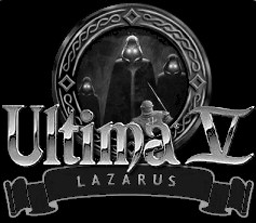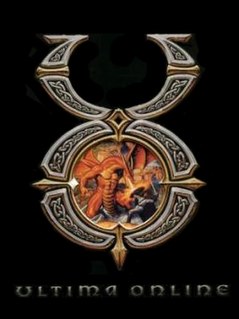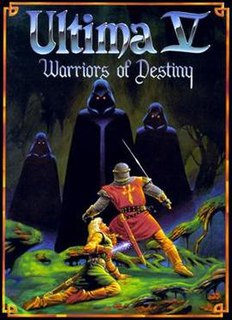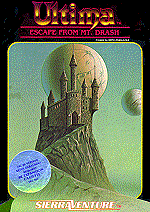 W
WUltima is a series of open world fantasy role-playing video games from Origin Systems, Inc. Ultima was created by Richard Garriott. A significant series in computer game history, it is considered, alongside Wizardry and Might and Magic, to be one of the establishers of the computer role-playing game genre. Several games of the series are considered seminal entries in their genre, and each installment introduced new innovations which then were widely copied by other games. Electronic Arts has owned the brand since 1992.
 W
WAkalabeth: World of Doom is a role-playing video game that had a limited release in 1979 and was then published by California Pacific Computer Company for the Apple II in 1980. Richard Garriott designed the game as a hobbyist project, which is now recognized as one of the earliest known examples of a role-playing video game and as a predecessor of the Ultima series of games that started Garriott's career.
 W
WRichard Allen Garriott de Cayeux is an American video game developer, entrepreneur and astronaut. Although both his parents were American, he maintains dual British and American citizenship by birth.
 W
WUltima Underworld II: Labyrinth of Worlds is a 1993 first-person role-playing video game developed by LookingGlass Technologies and published by Origin Systems. As the sequel to Ultima Underworld: The Stygian Abyss, the game is set in the Ultima fantasy universe. Players assume the role of the Avatar—the protagonist of the Ultima series—and adventure through multiple dimensions while seeking to prevent the evil Guardian from achieving world domination. Progression is largely nonlinear and the game allows for emergent gameplay.
 W
WLord of Ultima was a free-to-play, browser-based, massively multiplayer real-time strategy (MMORTS) video game by Electronic Arts. The game started a beta test on April 20, 2010 and was developed by EA Phenomic. While it is, technically, part of the Ultima series of games, there was very little actual connection to the other games in the series.
 W
WCaroline Spector is a science fiction and fantasy writer who has also written role-playing game modules and computer game hint books. She also spent two years as Associate Editor at Amazing Stories magazine. She is a member of George R. R. Martin's Wild Cards consortium, the group of contributing authors to the ongoing Wild Cards shared world original story anthology series edited by Martin, now in its 22nd volume, and currently published by Tor Books.
 W
WWarren Evan Spector is an American role-playing and video game designer, director, writer, producer and production designer. He is known for creating immersive sim games, which give players a wide variety of choices in how to progress. Consequences of those choices are then shown in the simulated game world in subsequent levels or missions. He is best known for the critically acclaimed video game Deus Ex that embodies the choice and consequence philosophy while combining elements of the first-person shooter, role-playing, and adventure game genres. In addition to Deus Ex, Spector is known for his work while employed by Looking Glass Studios, where he was involved in the creation of several acclaimed titles including Ultima Underworld, Ultima Underworld II, System Shock, and Thief: The Dark Project. He is employed by OtherSide Entertainment, where he is part of the development team for the upcoming game System Shock 3.
 W
WUltima Underworld: The Stygian Abyss is a first-person role-playing video game (RPG) developed by Blue Sky Productions and published by Origin Systems. Released in March 1992, the game is set in the fantasy world of the Ultima series. It takes place inside the Great Stygian Abyss: a large cave system that contains the remnants of a failed utopian civilization. The player assumes the role of the Avatar—the Ultima series's protagonist—and attempts to find and rescue a baron's kidnapped daughter.
 W
WUltima V: Lazarus is a fan-made remake of Ultima V. The game uses Gas Powered Games' Dungeon Siege engine, and that game is required to play the remake. It is an attempt to reconstruct the original title, including an elaborated plot, strategy elements and updated conversational mechanisms to resemble 2005 game dialog systems.
 W
WUltima Forever: Quest for the Avatar was a free-to-play, cross-platform, online, action role-playing game developed by Mythic Entertainment and Escalation Studios and published by Electronic Arts. It was formally a part of the Ultima series. Information was previously released by BioWare in mid-2011 and more information was released on July 11, 2011. It was officially announced at the San Diego Comic-Con International on July 12, 2012 and it was fully released for iOS on August 7, 2013. The game was shut down on August 29, 2014.
 W
WUltima, later known as Ultima I: The First Age of Darkness or simply Ultima I, is the first game in the Ultima series of role-playing video games created by Richard Garriott, originally released for the Apple II. It was first published in the United States by California Pacific Computer Company, which registered a copyright for the game on September 2, 1980 and officially released it in June 1981. Since its release, the game has been completely re-coded and ported to many different platforms. The 1986 re-code of Ultima is the most commonly known and available version of the game.
 W
WUltima II: The Revenge of the Enchantress, released on August 24, 1982 for the Apple II, is the second role-playing video game in the Ultima series, and the second installment in Ultima's "Age of Darkness" trilogy.
 W
WUltima III: Exodus is the third game in the series of Ultima role-playing video games. Exodus is also the name of the game's principal antagonist. It is the final installment in the "Age of Darkness" trilogy. Released in 1983, it was the first Ultima game published by Origin Systems. Originally developed for the Apple II, Exodus was eventually ported to 13 other platforms, including a NES/Famicom remake.
 W
WUltima IV: Quest of the Avatar, first released in 1985 for the Apple II, is the fourth in the series of Ultima role-playing video games. It is the first in the "Age of Enlightenment" trilogy, shifting the series from the hack and slash, dungeon crawl gameplay of its "Age of Darkness" predecessors towards an ethically-nuanced, story-driven approach. Ultima IV has a much larger game world than its predecessors, with an overworld map sixteen times the size of Ultima III and puzzle-filled dungeon rooms to explore. Ultima IV further advances the franchise with dialog improvements, new means of travel and exploration, and world interactivity.
 W
WUltima IX: Ascension is the ninth and final part of the main series of the role-playing video game series Ultima. Developed by Origin Systems and published by Electronic Arts, Ultima IX was released in 1999 for Microsoft Windows after years in development hell. Following the Avatar's escape from Pagan, he is transported back to Britannia for one final battle with the Guardian, who is increasingly ruining the physical and moral fabric of that land by the use of eight columns. The Avatar must fight his way to the runes of virtue found in each of the columns, and cleanse them in the shrines of Virtue, then face off against the Guardian himself.
 W
WUltima Online (UO) is a fantasy massively multiplayer online role-playing game (MMORPG) released on September 24, 1997 by Origin Systems.
 W
WUltima V: Warriors of Destiny is the fifth entry in the role-playing video game series Ultima released in March 1988. It is the second in the "Age of Enlightenment" trilogy. The game's story takes a darker turn from its predecessor Ultima IV. Britannia's king Lord British is missing, replaced by a tyrant named Lord Blackthorn. The player must navigate a totalitarian world bent on enforcing its virtues through draconian means.
 W
WUltima VI: The False Prophet, released by Origin Systems Inc. in 1990, is the sixth part in the role-playing video game series of Ultima. It is the third and final game in the "Age of Enlightenment" trilogy. Ultima VI sees the player return to Britannia, at war with a race of gargoyles from another land, struggling to stop a prophecy from ending their race. The player must help defend Britannia against these gargoyles, and ultimately discover the secrets about both lands and its peoples.
 W
WUltima VII Part Two: Serpent Isle is a role-playing video game released in 1993 as part of the core Ultima series, its story beginning eighteen months after the conclusion of Ultima VII: The Black Gate. In Serpent Isle, the Avatar follows Batlin to the eponymous land called Serpent Isle, finding three city-states founded by those who left Britannia generations before and ancient ruins from a still-older lost civilization that was there long before them.
 W
WUltima VII: The Black Gate is the seventh installment of the Ultima series of role-playing video games, released on April 16, 1992. In it the player returns as The Avatar, a would-be paragon of moral virtue who faces down many dangers and deceptions in order to cleanse the medieval fantasy world of Britannia of assorted plots and schemes, monster infestations, and the undermining of crown authority.
 W
WUltima VIII: Pagan is a role-playing video game, released as the eighth part of the Ultima series. It was not as well-received as its predecessors, Ultima VII and Ultima VII Part Two: Serpent Isle. Developed in 1994, it is a DOS-only title and is also the first game in the series to be rated M in North America.
 W
WUltima X: Odyssey was to be a massively multiplayer online role-playing game (MMORPG) based in the Ultima universe, developed by Origin Systems for Electronic Arts.
 W
WUltima: Escape from Mt. Drash is a role-playing video game published for the Commodore VIC-20 home computer by Sierra On-Line in 1983.
 W
WUnderworld Ascendant is a first-person action role-playing game developed by Otherside Entertainment and published by 505 Games. It is the sequel to Ultima Underworld: The Stygian Abyss and Ultima Underworld II: Labyrinth of Worlds. Players assume the role of the Avatar, as they return to the Stygian Abyss. As in the original games, there is an emphasis on non-linear progression, simulated systems, and emergent gameplay. It was released on Microsoft Windows on November 15, 2018.
 W
WUltima: Worlds of Adventure 2: Martian Dreams is a role-playing video game set in the Ultima series, published in 1991, and re-released for Windows and Mac OS via GOG.com in 2012. It uses the same engine as Ultima VI, as did the first Worlds of Ultima game, The Savage Empire.
 W
WWorlds of Ultima: The Savage Empire is a role-playing video game set in the Ultima series, published in 1990. It is considered a Worlds of Ultima game, as its setting differs from that of the main series. It uses the same engine as Ultima VI. On June 18, 2012, Electronic Arts released the game as freeware through GOG.com.